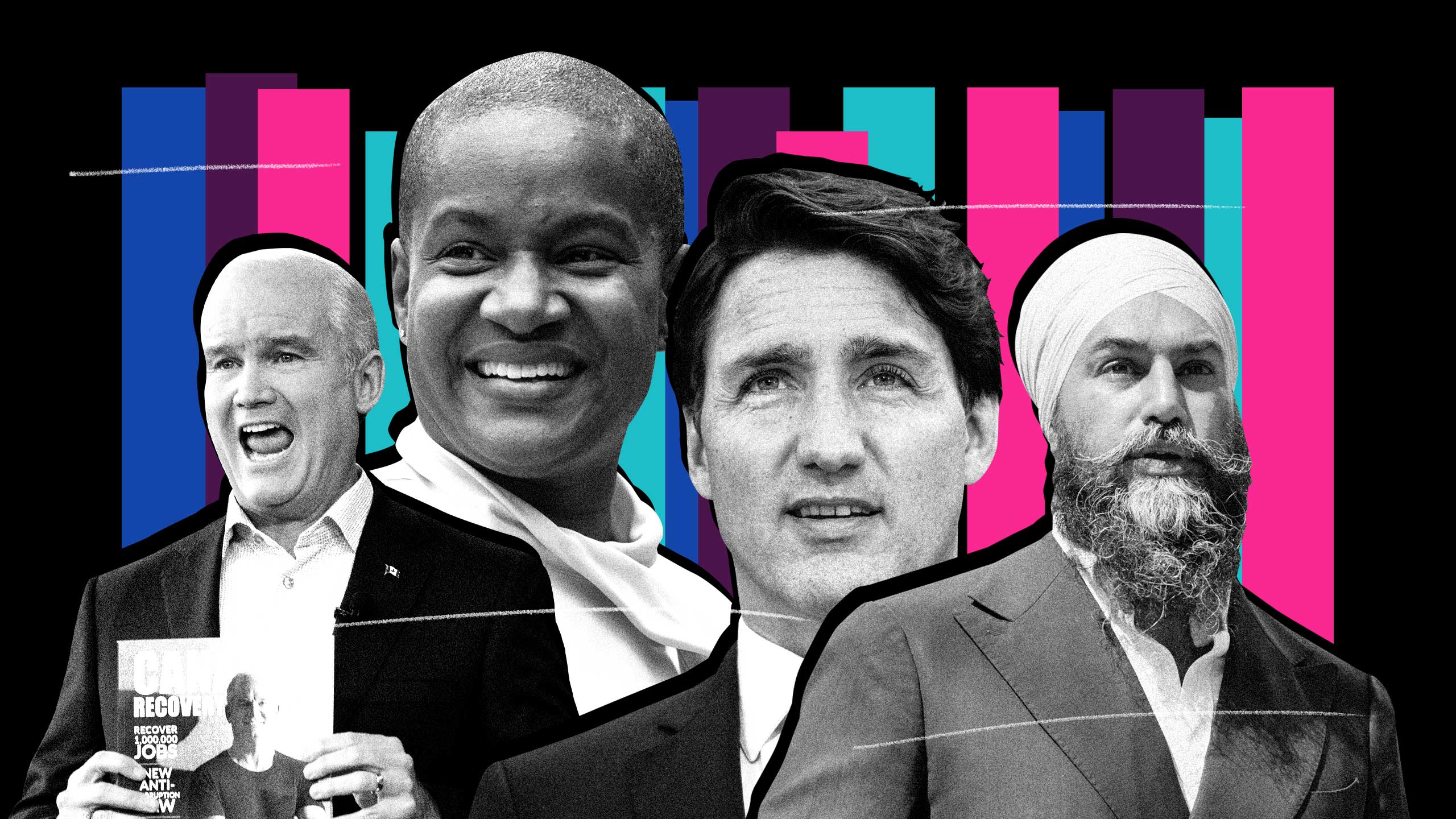The 2021 Canadian federal election is in full swing. Writs are dropped, campaign signs dot highways and promises are being made from the left, right and centre, and everywhere in between.
But behind all of the promises and poppers, where do the federal parties actually stand on LGBTQ2S+ issues? Just like last time—and 2019 truly feels like yesterday—we here at Xtra have rounded up everything you need to know. And we’ll keep things updated as the campaign continues toward election day on Sept. 20.
Liberal Party of Canada
Of the three major parties, the Liberals were the last to drop their full platform. Still, LGBTQ2S+ issues came up on the campaign trail, and their track record pointed to what we could expect would get some attention in the platform once it was released. Now that the platform’s here, there were few surprises.
Conversion therapy: When Canada’s federal conversion therapy bill failed to pass in June, it was with the Liberals in the driver’s seat. Justin Trudeau’s government shares some of the blame, alongside the Conservatives, for the stalling of the long-awaited bill in the Senate, which essentially set everything back to square one.
When asked about it on the campaign trail, Trudeau blamed the Conservatives for the delay, and said his party was committed to having the bill pass.
“We have taken this serious from the very beginning because we kept pushing it, even during a global pandemic, and it is going to be an absolute priority for us, if we get re-elected,” he said.
In their platform released Sept. 1, Trudeau promises to pass the bill within his first 100 days. So the Liberals are hoping that a second (or third) time’s the charm.
Blood ban: Stop me if you’ve heard this one before. Much like conversion therapy, expect the Liberals to double down on their promises to end the discriminatory ban on men who have sex with men and trans women donating blood. It’s another promise made in the previous election (and the one before that) that has yet to see the light of day in full force. Back in June, Trudeau blamed the COVID-19 pandemic for delaying the research process.
Otherwise the platform promises $40 million over four years to Canadian LGBTQ2S+ organizations and adding more parental leave for adoptive parents. The Liberals have also tacked on “and LGBTQ2 people” to many other promises related to Indigenous issues, climate change and the economy.
Conservative Party of Canada
Not long after the election was called, the Conservative Party of Canada dropped a big, beefy platform document that includes a variety of issues—and LGBTQ2S+ folks even got a whole half of a page devoted to us. Here’s what you need to know.
Conversion therapy: The Conservatives blame the Liberal minority government for the conversion therapy bill not passing, and leader Erin O’Toole voted in favour of it himself. However, the party also introduced questions and concerns late into the bill’s process that led to delays and its ultimate stalling.
Like the other parties, the Tories include banning conversion therapy in their platform. Unlike the other parties, however, theirs includes amendments to clarify that “the ban does not criminalize non-coercive conversations.” This has been flagged as a concern by advocates of a proper, full ban.
Blood ban: In their platform, the Tories point out Trudeau’s failed promise to end the blood ban. They promise that they will, but do not lay out how they plan to do it.
Conscience rights: A Conservative government will advocate for the “conscience rights” of medical professionals. While the actual platform document is pretty vague as to what that means (especially as health care is provincial jurisdiction), now is a great time remind everyone how conscience rights have repeatedly been invoked to deny health care access to trans people, as well as abortions, contraception and a slew of other services LGBTQ2S+ people access.
Poppers: The Tories—led by incumbent Calgary-Nose Hill candidate Michelle Rempel Garner—said on the campaign trail that they will look into legalizing poppers. Amyl nitrates, also known as poppers, are commonly used by people, mostly in the gay community, to facilitate sex. They’re also used more generally as a party drug as they create a short rush of high. Poppers aren’t technically illegal, and are often sold as nail polish remover, among other things. But Rempel Garner shared a letter just ahead of the election urging Health Canada to explore regulating them for sexual use.
O’Toole was asked about the poppers of it all on the campaign trail, and said he’s open to exploring the idea.
“I want members of the LGBT community to know if they want something looked at, if they’re advocating for an issue—as Michelle has, as I have, as other members of our caucus have—we want to make sure that a federal government is responsive to the needs of all Canadians in all communities,“ he said. “We will advocate, including asking for Health Canada to examine issues of concern to the LGBT community.”
New Democratic Party
Like so many things in this election, the NDP, along with leader Jagmeet Singh, looked at their 2019 platform and said, “Sure, let’s run it back.” Their stances on LGBTQ2S+ issues are no different.
The party has historically supported LGBTQ2S+ issues, being the first to declare open support for the community back in the 1980s and ensuring all MPs voted in favour of marriage equality in 2005. In the last election, the party boasted the greatest number of self-declared, openly LGBTQ2S+ candidates, according to Xtra. But does a roster full of trans and queer folks mean good LGBTQ2S+ policies? Here are the highlights.
Conversion therapy: A bill that really could have been passed last time around is the belle of the ball when it comes to LGBTQ2S+ issues this election, and it’s no different for the NDP.
From this year’s NDP platform: “We will immediately legislate a ban on conversion therapy in Canada, and work with provinces and territories to support eliminating this practice in all parts of the country.”
The party also blames the Liberals for “stalling” for six years on the issue. NDP MP Sheri Benson was the first to table a petition calling on the federal government to take action to ban the practice back in 2019. At the time, the Liberal government said it was provincial jurisdiction, then switched course and brought in their own bill that memorably stalled out in the Senate right at the end of the most recent session.
Expect the topic of why it stalled—and what the NDP will do differently—to come up throughout the campaign.
Health care: The party promises to make sure there is “equal access” to gender-confirming surgeries across Canada, and that public health plans cover all medications and procedures. This is in line with their other stances on universal pharmacare—which would, of course, cover hormone replacement therapies like testosterone and estrogen. The party acknowledges that health care-related policies would require some work with the provinces and territories.
Employment equity: The party tosses a line into their platform on more general employment inequities faced by the LGBTQ2S+ community.
“A New Democrat government will add sexual orientation, gender identity and expression to the Employment Equity Act, in order to address the disadvantages experienced by the LGBTGQ2+ [sic] communities—and particularly Transgender [sic] people—in finding work,” the platform reads.
The Employment Equity Act was first introduced in 1995 and lays out how people can’t be discriminated against when it comes to employment. It doesn’t currently list any LGBTQ2S+ groups in its text.
Green Party of Canada
Ahead of releasing their platform, Green Leader Annamie Paul encouraged voters to Google her party’s stance on issues like climate change, saying it will be similar to their stances in the past.
This year, the Greens followed up their extensive 2019 platform section on LGBTQ2S+ rights with pretty much the same set of broad promises for 2021. Knowing that they will not form government any time soon, the party is able to make grand promises, like repealing all federal laws and policies that are discriminatory on the grounds of sexuality, ending the blood ban and banning conversion therapy.
They also promise to make it easier to change one’s gender and name on government-issued documents, to make washrooms gender-neutral in federal buildings and overhaul the census (something the current government has done).
Inexplicably, the platform also includes at least five different versions of the “LGBTQ2S+” acronym throughout its text, from LGBTQ+ to 2SLGBTQ to LGBTQIA+ and more. Whether this is some policy writer trying to be extra clear as to what applies to each letter identity, or a copyediting error in line with the Greens’ general mess going on right now is unclear, though we’re inclined to guess the latter.
All of the rest
Prior to the dissolution of Parliament, no other Anglo party (pardon to the Bloc) had any sitting MPs. Still, there are some notable things to keep an eye on.
The right-wing Peoples’ Party of Canada has pushed for the repeal of Bill C-16, and leader Maxime Bernier has repeatedly spoken out against diversity. The party also ran notably homophobic and transphobic candidates in the last election.
The new hotness—the western separatist Maverick Party, headed by former Tory cabinet minister Jay Hill—is unlikely to win any seats. But the “Wexit” movement they were born from quite recently embraced openly homophobic and transphobic messaging.
Want even more exclusive Canadian politics content? Subscribe to “Rainbow Votes 2021,” a special Canadian election newsletter by Xtra. Subscribe to receive the newsletter directly in your inbox, every Thursday.


 Why you can trust Xtra
Why you can trust Xtra


